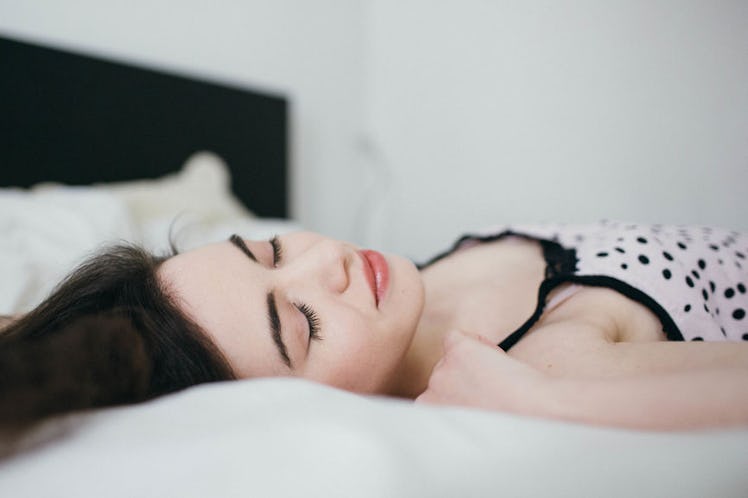
Doing This One Thing During The Day Might Help You Fall Into A Deeper Sleep Later On
Tell me, friends, is there anything more off-putting than waking up exhausted? While rising and (hardly) shining before your alarm, even though you clearly could have used an extra few minutes of shut-eye, can make or break your day, science says rearranging your schedule to get a workout in could make or break your quality of sleep. New research suggests working out can affect your sleep in ways you might not realize, such that a few minutes of physical activity could yield a few extra minutes of prime snoozing time. Sounds like a pretty decent tradeoff to me, don't you think?
SleepCycle, an alarm clock and sleep-tracking app, recently released a report containing three years of data, all based on the sleep cycles and behaviors of the app's more than three million active users. According to a press release sent to Elite Daily, experts behind the app found that the best sleepers in America exercise on a regular basis. What’s more, those who scheduled their workout during the day scored a whopping 10 extra minutes of shut-eye on average, and they snored less than non-exercisers. Coincidence? SleepCycle seems to think not, and from what I can tell, statistics rarely lie.
So let’s look at the evidence, shall we? According to research published in the December 2011 issue of the journal Mental Health and Physical Activity, which analyzed data from roughly 3,000 people between 18 and 85 years old, people who exercise for at least 150 minutes per week (aka about two and a half hours, which also happens to be the national guideline recommendation) tend to see, on average, a 65 percent improvement in their overall sleep quality, per a press release from Oregon State University (OSU). If you were to break that down, that’s only 30 minutes of exercise a day, which, IMO, sounds pretty manageable, right?
Brad Cardinal, a professor of exercise science at OSU and an author of the study, said in a statement that the research was actually originally intended to explore how the national exercise guidelines affect cardiovascular health. In the end, however, his team's results showed that the benefits of exercise apparently spill over to other areas of health, specifically those related to sleep. And BTW, the 2011 research began almost 15 years ago, which suggests that SleepCycle’s latest data is right on track.
“Physical activity may not just be good for the waistline and heart, but it also can help you sleep,” Cardinal explained in the OSU press release. “There are trade-offs. It may be easier when you are tired to skip the workout and go to sleep, but it may be beneficial for your long-term health to make the hard decision and get your exercise.”
Obviously sleep and exercise are both essential to your overall well-being, but what is it about working out that has such a positive effect on your sleep quality? Like, what’s actually going on in the body during a workout that leads to such a delicious night’s sleep later on? To find out, I reached out to Rachel Wong, a Reverie certified sleep coach.
Basically, Wong tells me, when you demand a lot from your body while exercising, your body, in turn, demands a lot of rest and relaxation to soothe and repair its muscles. So, if you think about it, Wong explains, deep sleep (or, in technical terms, "slow wave sleep"), is when your body “goes to the spa,” in a sense.
“If you look at the sleeping habits of many elite athletes, you'll see a lot of them actually sleep significantly more than the typical seven to nine hours a night,” Wong tells Elite Daily. This is because, when your body falls into a deep sleep, it reaches “peak HGH production — that magical hormone that promotes muscle development and tissue repair,” she explains. And if you’re someone who’s engaging in rigorous exercises on the reg, like cycling, circuits, or kickboxing, for example, your body needs that good night’s sleep to recuperate.
But rest assured, you don’t have to be an Olympic athlete to score good-quality sleep. In fact, as far as Wong is concerned, you just have to get active. “You don't have to sweat to earn your sleep,” Wong tells Elite Daily. In other words, anything that gets you moving a little more than usual — like parking further away from a building so you have to walk a little more to get there, or playing with a dog, or walking to a co-worker’s desk instead of emailing them — can suffice, according to Wong.
Additionally, she explains, it's important to remember how sensitive your body is to natural sources of light, and how that affects your overall sleep quality. By taking in natural light during the day and avoiding artificial light in the evening, says Wong, you can help your body get into a groove of "consistent, high-quality sleep.” So, if you're able to take your daytime sweat sesh outside in the sunlight, go for it.
If you’re looking for a little more guidance in terms of how to exercise for better sleep, Dr. Roy Raymann, resident sleep expert and vice president of sleep science and scientific affairs at SleepScore Labs, says that cardio, strength training, and morning workouts have all been linked to quality rest. However, Dr. Raymann also tells Elite Daily that, while any and all exercise is great for sleep, it's important to be mindful of your own individual skill-set. “Any kind of extra workout is great, as long as it matches with your fitness level,” he explains. “You don’t want to end up in bed with too sore muscles and pain; that will keep you from sleeping great.”